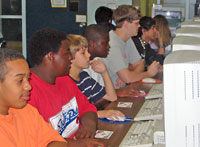Wayne students learn about voting by voting
By Phyllis Moore
Published in News on October 20, 2004 2:01 PM
The polls close tonight at 10. By morning, a new United States president will be announced.
But even though it is a nationwide vote, it won't be enforceable since the ballots were submitted by middle and high school students.
OneVote, sponsored by Channel One, a daily 12-minute news program broadcast in schools across the country, is being touted as the largest on-line mock election for students.

News-Argus/Phyllis Moore
Students from Karen Smith's business class at Eastern Wayne High School prepare to cast their votes for president via computer in the school's media center.
Participating schools have used the effort as a teaching tool since the beginning of the school year.
Charlotte Macartney, a world-history teacher at Eastern Wayne High School, said she has led classroom discussions about the issues in the election but has steered clear of giving her opinion.
She said she was finding that most students were inclined to vote like their parents.
"They don't know a lot (about the political process) and are still taking direction," she said.
"I think once they see the results on Channel One, they'll be a lot more excited."
Polls for the election opened on Tuesday morning, with classes paraded through Eastern Wayne's library to vote by computer. Other county schools participating in the OneVote include Charles B. Aycock, Goldsboro, Rosewood, and Southern Wayne high schools; and Dillard, Eastern Wayne, Goldsboro, Greenwood, Mount Olive, Norwayne, and Rosewood middle schools.
Easter Wayne High School media coordinator Mary Ann Parker said students could also vote in some classrooms and at home, as long as they had a ballot.
She said the response has been excellent.
"A lot of our teachers have been talking about this," she said. "We have had teachers from all different subject areas come in wanting ballots for their students."
Each paper ballot has a code that must be entered into the computer in order to register to vote. The code prevents each person from casting more than one vote.
While students only vote in one category, for president, there is also an exit poll that asks such things as what the voter considers the most important issue in the election, whether he favored going to war, and how he would describe himself politically.
Ms. Parker said the practical application has been a good way to get youth talking about the presidential election.
Danielle Ward, 17, is a senior at the school. She said voting, even in a mock election, gives her a chance to be heard and prepares her for voting in the future.
"It makes me feel like somebody is listening to what I have to say," she said.
Ms. Ward said she has talked with others about the election, which has helped her understand more about the issues. She has also tried to encourage others who are eligible to exercise the right to vote.
"People are always talking about what they want in the future for our country," she said. "But if you're not voting, you're not making a difference; you're just talking."
Angelica McLean, 15 and a sophomore, said she will not take it for granted when she reaches the age to vote.
"It does make a difference," she said.
She said she has talked with her family about the election, watched the news and heard the speeches so she would know for whom to cast her vote.
This week's mock election, she said, "gives me an opportunity to put my opinions out there, a chance to be heard by the public."
